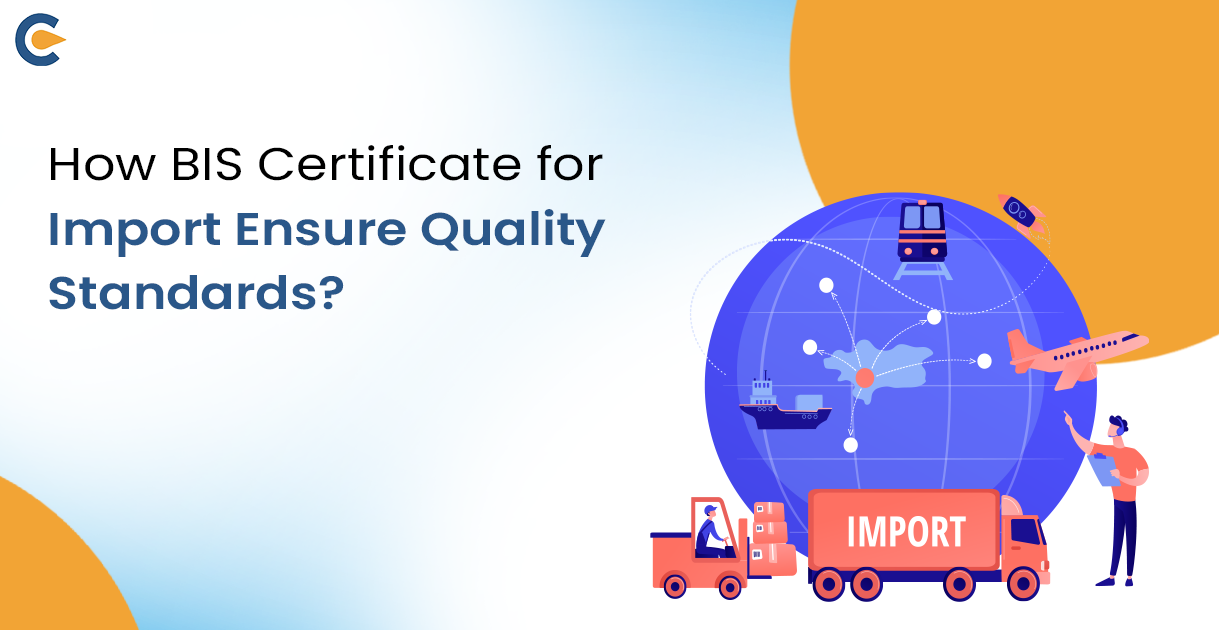A national standards organization, the Bureau of Indian Standards (BIS) promotes the orderly growth of the standardization, conformity assessment, and quality assurance of products, articles, systems, processes, and services.
Beyond reducing consumer health risks and delivering safe and dependable goods, BIS has been contributing measurable and verifiable advantages to the country’s economy. Through its conformity assessment program, the bureau authorizes firms in a variety of industrial sectors, from textiles to agriculture, and issues licenses and certificates of conformity. Additionally, although the BIS standards are optional, the Indian government has made some items necessary to be certified, leading to a large number of quality control orders being issued for those products.
In this blog, we’ll go over the reasons why BIS certification is crucial for imported products in the current market, as well as the advantages of becoming certified, the steps involved in getting certified, the sectors that need it, and the difficulties in getting certified.
BIS Certification for Import
Every nation has its unique requirements for producing and distributing things. In a similar vein, all manufactured and imported goods into India must adhere to BIS-specified Indian standards. The Indian government enforces a vital method for quality and safety assurance in the form of BIS (Bureau of Indian Standards) certification for imports. It guarantees that goods imported into India from foreign nations comply with the rules and specifications set out by India. The Bureau of Indian Standards issues the BIS certificate as a seal of approval to demonstrate to a third party the security, dependability, and reliability of items meant for consumer use. Manufacturers who meet the standards for the public interest, national security, environmental safety, and the prevention of unfair trade practices are granted licenses by BIS.
What is BIS?
BIS Certification is issued in India by the Bureau of Indian Standards (BIS). In light of public health and safety concerns, the Indian government has mandated that firms operating inside its borders receive this Certification through the appropriate program.
Increased consumer trust and confidence in the products, quality assurance, customer safety from potentially dangerous items, and public health protection are the goals of BIS Certification. Only when a product sample has been tested in BIS-approved laboratories is the product awarded BIS Certification; as a result, BIS-tested and certified items guarantee a quality inspection and are high-quality goods or products.
BIS is a National Standard Body that was founded in accordance with the BIS Act of 2016, with the primary goal of ensuring the smooth growth of product certification, marking, and standardization. Furthermore, the goal of BIS is to assist the Indian economy through tangibility and traceability.
Why is the BIS Certificate Essential for Importers?
For the following reasons, a BIS certificate for import is required for every goods coming into India:
- By getting a BIS certificate for import, an importer might have a competitive edge over its rivals in the import of toys, rechargeable batteries, and feed for cattle, appliances for the kitchen, or any other commodities covered by BIS.
- A BIS certificate for import indicates that a product has undergone testing and complied with set standards, making it a signal of a high calibre or quality goods.
- A BIS certificate for import guarantees the product’s dependability, safety, and high calibre.
- The public is guaranteed to get high-quality, dependable, risk-free, and safe items owing to the BIS certificate for import.
- The product needs a BIS certificate for import in order to be sold in the Indian market.
- The product quality is guaranteed by the BIS certificate for import, which uses the standard mark on the goods.
- One of the main reasons to acquire a BIS certificate for import is because it is a mark of safety and compliance that guarantees a product is safe for the end user.
- If the product is on the list of required certifications, a BIS certificate for import is needed for import. In the event that your product is classified as required, you must get a certificate; otherwise, the Indian market will not accept it.
Types of BIS Certificates for Import
There are two types of BIS certificates for import, depending on the product type.
The Foreign Manufacturer Certification Scheme (BIS FMCS)
The Bureau of Indian Standards manages a certification program for overseas manufacturers, allowing them to use the ISI Mark on their products and get a BIS license. All products are covered, with the exception of electronics and IT items. To sell the product in the Indian market, the foreign producer must make sure it satisfies Indian standards instead of the standards of their own nation as it is being sold to India. If the exported product is not an electronics or information technology item, the foreign producer is required to get BIS certification under the FMCS program.
Compulsory Registration Scheme (BIS registration for electronics and IT products)
The mandatory registration scheme is the next category of BIS Certificate for Import. A product imported under the Compulsory Registration Scheme must meet the BIS’s set requirements. Furthermore, when product testing, analysis, and documentation are completed, a product’s conformance will be declared. The ruling states that if a product does not meet BIS criteria, no importer can distribute or sell it in the Indian market. This program is relevant to IT and electrical devices.
Merits of BIS Certificate for Import
BIS Certification is a ticket to new opportunities for exporters, not merely a certification. The following section clarifies the major benefits that BIS Certification provides to individuals looking to enter foreign markets:-
- Increasing Access to Global Markets
- The BIS Certificate for Import provides access to global marketplaces. It guarantees that goods can be shipped to nations that value and acknowledge this certification. Exporters may reach a larger global audience by casting a wider net.
- Simplifying Export Processes
- By bringing items into compliance with Indian quality and safety norms, the BIS Certificate for Import streamlines the export process. This simplifies the export procedure by cutting down on paperwork and administrative obstacles. Exporters have an easier time navigating the sometimes complicated realm of international commerce.
- Getting a Competitive Benefit in International Trade
- The BIS Certificate for Import turns into a key selling point in the highly competitive world of international trade. In the global marketplace, it sets certified items apart from competitors by presenting them as superior, dependable, and secure options. In the context of international trade, this competitive advantage may be revolutionary.
- Improving Export Possibilities
- Exporters can access new export markets when they get a BIS Certificate for Import. To take advantage of these possible goldmines, they might enter areas where importing products requires a BIS Certificate for Import.
- Fulfilling Global Quality Requirements
- International quality standards are frequently in line with BIS requirements. Therefore, getting a BIS Certificate for Import can make it much easier to comply with regulations in international markets. This alignment makes market access easier and streamlines international trade procedures.
BIS Certificate for Import: Vital Documents and Procedure
The essential compulsory registration scheme documents for the BIS Certificate for Import are:
Compulsory Registration Scheme
Documents for BIS certificate for import:
- The AIR Nomination Letter
- The product’s test report
- Taking the initiative with the product
- The manufacturer’s ISO certificate
- Product handbook for used gadgets
- Trademark Certificate, if necessary or accessible
- Testing records, such as completed CDF and CCL forms
- Affidavit and Authorized Indian Representative (If a Foreign Manufacturer)
- Trademark Authorization Letter, in the event that the maker does not own the brand
- Submit the Authorization Letter if the signatory is not the manufacturing facility’s chief.
Foreign Manufacturer Certification Scheme
Documents for BIS certificate for import:
- List of Manufacturing Equipment
- A list of the plant’s machinery
- The manufacturing plant’s layout
- A document containing a trademark, if any
- Business license or certificate of incorporation equivalent
- The raw material testing report, if utilized in product manufacture
- A 10,000-dollar Refundable Performance bank guarantee must be provided to BIS.
Procedure for BIS Certification for Import
The following is the procedure for registering with the BIS to import electronic goods:
- Submitting an application: Using the BIS site, applicants must submit their applications online.
- Test request generation: In order to test the product, a test request will be created.
- Product testing: A laboratory certified by BIS will conduct the product’s testing.
- Application submission together with test report: Following the conclusion of testing, an online application will be sent to BIS along with all pertinent documentation and test results.
- Examination of the Application: BIS representatives will examine the application following its submission along with the test report.
- BIS Certificate Grant: The product maker will get a CRS certificate from BIS if the test report and supporting documentation meet the required criteria.
The following is the procedure for obtaining BIS certification for import in India
- Documentation: Prior to filing the application, the applicant must gather all necessary paperwork.
- Application Submission: Following documentation, the application form and pertinent files will be sent in.
- Examination of the Application: BIS representatives will examine the application that has been filed.
- Audit of manufacturing facilities: Following review, BIS will designate an auditor to conduct an audit of manufacturing facilities. A sample will be taken during the production facility inspection in order to be tested in a laboratory certified by the BIS.
- Sample testing: The laboratory designated by BIS will conduct the sample testing.
- BIS License Grant: Should the product meet the required standard, BIS will provide the manufacturer with a BIS license (FMCS certificate).
Validity of BIS Certificate for Import
For a maximum of two years, BIS registration certification under Scheme-I may be granted for the first time upon payment of the advance minimum marking fee. The types that are eligible for licensing are the only ones stated in the license. To extend the license’s validity and the kinds it covers, applications must be made with the requisite fees and accompanying paperwork under the terms of the present license.
A license may be renewed for a maximum of five years following the initial expiration date. The average time required for license issuing is six months, starting from the date of receipt of the complete application and its documentation. It might alter due to several factors, such as planning inspections, arranging for delays in responding to inquiries, shipping samples, and making payments.
Industries Requiring BIS Certificate for Import
BIS certification is needed in a number of sectors before imported goods may be marketed in the Indian market. The following industries require a BIS certificate in order to import:
IT and Electronic Goods
The next type of industries requiring a BIS certificate are IT and electronic goods. Before being sold in India, electronics and IT goods, including laptops, tablets, and mobile phones, must have BIS certification. The BIS certificate for import guarantees that the goods have undergone compliance testing and satisfy Indian safety and quality requirements.
Chemicals and Heavy Machinery
The next type of industries requiring a BIS certificate are chemicals and heavy machinery. In order to guarantee their safety and compliance with Indian requirements, chemicals and heavy machinery, including industrial chemicals and heavy-duty equipment, must get a BIS certificate for import. Thorough testing is part of the certification procedure, which verifies that the items meet Indian laws.
Food and Agricultural goods
The next type of industries requiring a BIS certificate is food and agricultural goods. A BIS certificate for import is also necessary for food and agricultural goods, which include packaged foods, fruits, and vegetables. The certification guarantees that the goods satisfy Indian quality requirements and are safe to eat.
Other sectors
A number of other sectors, such as toys, textiles, building materials, and medical equipment, also require a BIS certificate for import.
Conclusion
For importers, obtaining BIS certification is a strategic investment in the long-term viability and prosperity of your company in the Indian market, not merely a legal need. You may show that you are dedicated to quality, safety, and customer happiness by earning BIS accreditation. In the current market, BIS certification is necessary for imported goods, especially in India. By ensuring that the items fulfil Indian safety and quality requirements, BIS certification lowers the possibility of harm coming to end users and fosters customer confidence in the brand among Indians. But getting BIS certification for goods that are imported can be difficult; importers have to deal with complicated certification procedures, delays, high fees, language hurdles, and regulatory changes.
Frequently Asked Questions
For the following reasons, a BIS certificate for import is required for every good coming into India to guarantee the product’s dependability, safety, and high calibre.
Manufacturers of electronic devices are authorized by the BIS to apply or use the standard mark with a distinct R-number. Through registration based on a self-declaration of conformance for each product, producers can acquire BIS certification under the CRS by completing Form-I under smart registration.
All steel goods imported into the nation are required by the Quality Control Order to have an ISI and a BIS license number, be accompanied by a Mill Test Certificate, and have a BIS license or certification.
While ISO creates international standards that are embraced by many nations globally, BIS concentrates on norms that are unique to India. The ISO is a global network including national standards institutes from 161 nations, with one member per nation.
This is a certification intended for foreign manufacturers seeking a BIS license. The BIS certificate for import is designed to certify goods other than those related to electronics and information technology.
The manufacturer may apply for a unique registration number that is associated with their company, the location of their facility, their product, and their brand.
Getting the items registered with BIS is the duty of the manufacturer or its designated Indian agent.
Re-registering for the same product is not necessary. Once approved, registration is good for two years. On request, the original registration might be revalidated in accordance with the scheme’s rules.
The BIS certification is mostly optional. However, the central government has mandated conformity with Indian Standards for a variety of items due to a number of factors.
The date of production for items made domestically and the date of consignment arrival in India for goods made abroad would be taken into account for determining the deadlines.
The two types of BIS certificates for import are the Foreign Manufacturer Certification Scheme and the compulsory registration scheme.
Read our Article: What Is The Importance Of BIS Certification For Brand?













